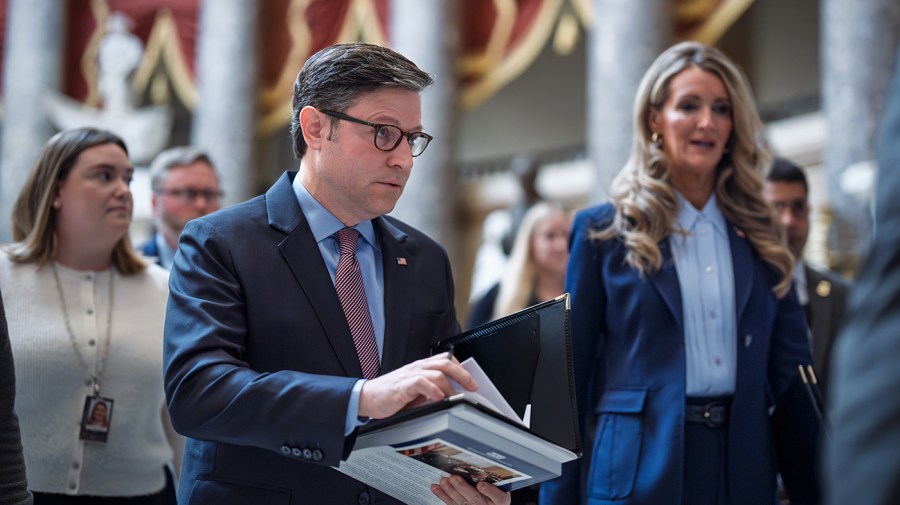The shutdown debate over expiring enhanced ObamaCare subsidies has put Republicans on the defensive over health care, reopening old wounds over the 2017 attempt to repeal and replace the law.
Fifteen years since the Affordable Care Act was passed, the scars from the repeal effort and the GOP’s lingering disgust for the law are influencing the party’s scattered response.
While Republicans are united in criticizing the law and the need for subsidies, there is no clear plan on how to deal with rising premiums if those subsidies are allowed to expire.
Democrats maintain they will not vote for any spending bill unless Republicans agree to an extension of the enhanced tax credits that help tens of millions of Americans purchase cheaper health plans.
They are seizing on the prospect of consumer sticker shock when faced with premium payments that could double on average next year, hoping it will bring Republicans to the negotiating table.
Democrats are feeling increasingly emboldened about their position.
Republicans’ ObamaCare repeal attempt cost them control of the House in 2018, and Democrats are confident their strategy this time will yield a similar result in the midterm elections.
“Democrats think it is a problem that people are going to lose their health coverage. Meanwhile, some Republicans seem to think it’s a problem that people got covered in the first place. Genuinely, some of my colleagues across the aisle can’t open their mouth without saying ‘repeal ObamaCare,’” Sen. Patty Murray (D-Wash.) said Tuesday.
Republicans have never voted for the expiring subsidy enhancements that were first introduced and then extended twice under former President Biden. They insist that Democrats vote to fund the government before there can be any talks about health care.
Senate Majority Leader John Thune (R-S.D.) said he’s offered Democrats a vote on the enhanced subsidies if they support the GOP continuing resolution to fund the government—an indication that he’s at least open to the idea of an extension.
But many Republicans are pressing for a conservative overhaul to the health system, if not an outright repeal of ObamaCare.
They also object to funding the tax credits, which they say are insurance company bailouts that are rife with fraud.
A September analysis from the nonpartisan Congressional Budget Office estimated that permanently extending the enhanced tax credits would cost $350 billion over the next decade. If the credits expire, there would be nearly 4 million fewer people with health insurance.
Complicating matters is the absence of a strong message from President Trump about health care broadly, or the enhanced subsidies specifically.
Dr. Mehmet Oz, the administrator of the Centers for Medicare and Medicaid Services, told “Meet the Press NOW” last week that Trump has a plan to replace the Affordable Care Act.
“I fully believe the president has a plan,” Oz said, without providing any specifics.
Speaker Mike Johnson (R-La.) earlier this month said he had “PTSD” from the 2017 repeal effort and acknowledged the “roots are so deep” that completely repealing the law would be too difficult.
But when asked during a Monday press conference about whether the GOP had a plan for dealing with the expiring tax credits, Johnson spoke about broader reforms and said the subsidies mask a broken system.
“The expiring ObamaCare subsidy at the end of the year is a serious problem,” Johnson said. “If you look at it objectively, you know that it is subsidizing bad policy. We’re throwing good money at a bad, broken system, and so it needs real reforms.”
Johnson said House Majority Leader Steve Scalise (R-La.) is working with the chairs of three House committees to compile a Republican health care plan.
Johnson didn’t elaborate on what the plan was or provide more details.
“We believe in the private sector and the free market and individual providers,” he added.
Johnson highlighted past GOP plans, including one he released when he was chair of the Republican Study Committee in 2019 that closely resembled the party’s ObamaCare replacement bill, the American Health Care Act (AHCA).
Republicans in recent days have brought up ideas like expanding health savings accounts and overhauling the pharmacy benefit manager industry.
They’ve also touted a provision in the House version of the tax-and-spending megabill on funding cost-sharing reduction reimbursements to private health plans that was stripped from the final version of that legislation in the Senate.
Yet any significant health reform would be difficult to pass before the end of the year, leaving Republicans without a public plan to address the expiring enhanced tax credits.
In the meantime, people enrolled in Affordable Care Act plans are being notified of hefty premium increases for 2026, putting political pressure on Republicans.
A group of 13 battleground House Republicans wrote to Johnson earlier this month that the party must “immediately turn our focus to the growing crisis of health care affordability” once the shutdown ends.
“While we did not create this crisis, we now have both the responsibility and the opportunity to address it,” the lawmakers wrote.
According to health research group KFF, nearly 6 in 10 people who have health coverage through the ACA marketplace live in congressional districts represented by a Republican.
Other prominent conservative lawmakers, most notably Rep. Marjorie Taylor Greene (Ga.) and Sen. Josh Hawley (Mo.), have also sounded the alarm about the effects of rising insurance rates.
During a private call with House Republicans on Tuesday, Greene called out Johnson for not providing any plans to deal with the expiring subsidies
“Johnson said he’s got ideas and pages of policy ideas and committees of jurisdiction are working on it, but he refused to give one policy proposal to our GOP conference on our own conference call. Apparently I have to go into a SCIF to find out the Republican healthcare plan!!!” Greene wrote.

